on the afternoon of november 19, tsinghua sppm successfully held the global development and china’s modernization international forum. the forum is part of the series events of the 2022 tsinghua sppm global advisory board (gab) meeting.
invited guests and experts from home and abroad participated and engaged in in-depth discussions on key issues in global development and china’s modernization. they include gu shengzu, vice chairman of the national committee of the chinese’s people’s political consultative conference, and economist; luo zhaohui, chairperson of the china international development cooperation agency; jiang xiaojuan, member of the standing committee of the national people's congress of the people's republic of china, vice chairperson of the committee of social construction of the national people's congress of the people's republic of china, and chairperson of the chinese public administration society; wu hongbo, special representative of the chinese government on european affairs, and former under-secretary-general of the united nations; irina bokova, former director-general of unesco; vanessa sherrer, vice president of sciences po.; yan jirong, dean of the school of government at peking university; yan jinming, dean of the school of public administration and policy at renmin university of china; ngaire woods, dean of the blavatnik school of government at oxford university; danny quah, dean of the lee kuan yew school of public policy at national university of singapore; peng wensheng, chief economist of china international capital corporation limited (cicc), and executive dean of cicc global institute; hu an’gang, senior professor in liberal arts of tsinghua university, and dean of the institute for contemporary china studies of tsinghua university.
peng zongchao, party secretary of tsinghua sppm, presided over the forum opening ceremony. wang xiqin, president of tsinghua university, and yang bin, vice president of tsinghua university and dean of tsinghua sppm have attended the forum.
gu shengzu delivered his keynote speech titled “to realize chinese modernization, improving the efficacy of the national innovation system” at the opening ceremony. gu pointed out that the chinese modernization has both shared the common features of universal modernization modes and developed with chinese characteristics based on its national conditions. the key to improving innovation efficacy and to realizing the innovation-driven development lies in the deep integration of innovation, technology, capital, and talent chains. transformation of scientific discoveries and technological inventions must be led to evolve toward the industrialization of high-techs. moreover, industry-university-research integration must be strengthened with the cultivation of strategic scientists, engineers and technology masters who shall be widely supported by national research institutions, top research universities, and pioneer science and technology companies. in terms of technology transformation and industrialization, innovative corporations could learn from the greater bay area, the experience of which can help overcome the bottlenecks in such processes and eventually achieve breakthroughs in their business development.
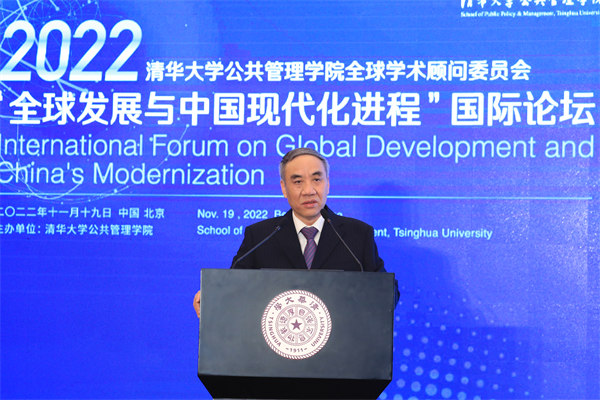
(gu shengzu delivered a keynote speech)
luo zhaohui delivered the keynote speech titled “china’s international development cooperation in the new era: a driving force of global development”. luo asserted that as a developing country, china values its modernization and global development. more than a mere advocate of international development and cooperation, china is also an active executor of such a belief, which is widely shown in its efforts of encouraging international anti-pandemic measures, collaboratively building the belt-and-road initiative, exercising the global development agenda, sharing the chinese experience in national governance, and exploring ways of multilateral collaboration. he explained the underlying philosophy of china’s foreign aid strategy and international development cooperation pattern over the past 72 years, as well as the differences between china and the western society in terms of ideology and in practice. in the near future, he projected the following four trends of international cooperation. first, china will continue leading the international development cooperation. second, the south-north battle in international development cooperation will intensify. third, the south-south cooperation will be more valued. lastly, multilateral entities will play increasingly important roles.
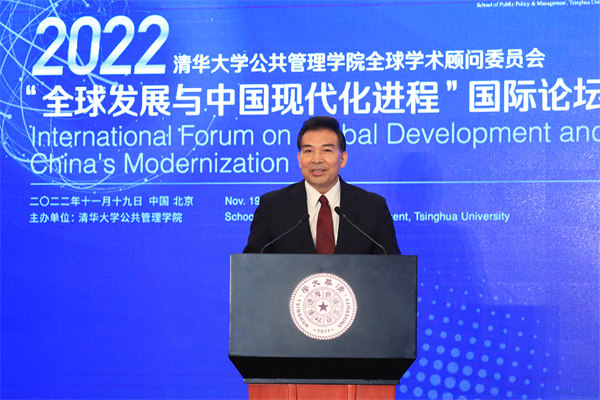
(luo zhaohui delivered the keynote speech)
yang bin addressed the opening remarks to the audience. he welcomed the invited guests and experts on behalf of tsinghua university and tsinghua sppm for their participation both online and offline. he emphasized that development is a permanent theme for human society. thus, discussions on the past experiences and future development of chinese modernization have extraordinary indications for the global society. as inheritance of human civilization, universities are a major force in driving academic interaction, idea exchanges, and cultural mingling. in this aspect, the public administration discipline is expected to play a particular role in global development and in china’s modernization by supporting the accumulation of knowledge, theories, and ideas, as well as contributing to the growth of human wisdom.
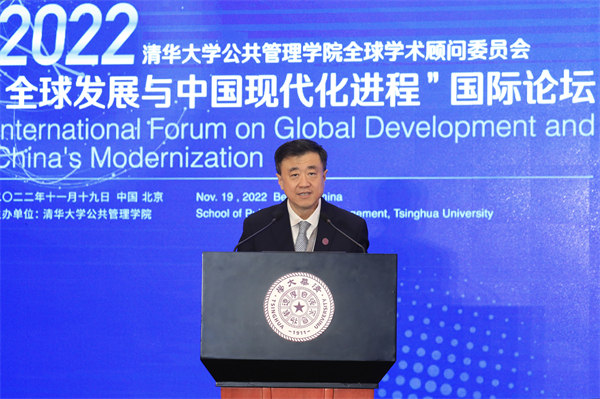
(yang bin addressed the opening remarks to the audience)
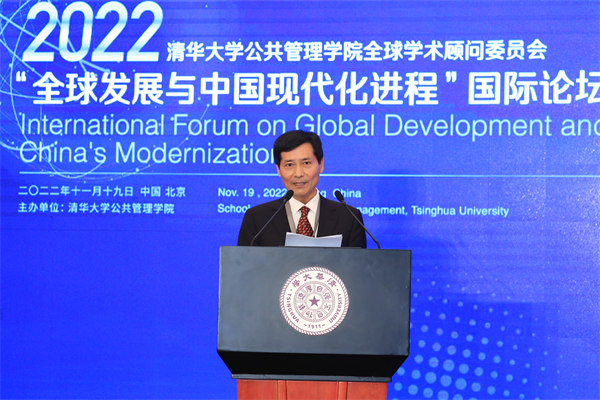
(peng zongchao presided over the forum opening ceremony)
the international forum was composed by two panels of different subjects, and the deans’ round-table dialogue.
panel one: global development and international cooperation
wu hongbo delivered the keynote speech titled “global development at a crossroad.” wu introduced the eight predicaments faced by the un agenda 2030 for sustainable development, such as imbalanced development, food shortage, and exacerbated poverty etc., as well as the four major challenges commonly existing in international cooperation. thereafter, he shared china’s experiences and advocacies in six areas: peace and safety, global development, environment protection, international anti-pandemic measures, win-win cooperation, and building a community with a shared future for all mankind. he noted that at the crossroad of global development, china has unwaveringly chosen to stand with what the history confirms and what will benefit human progress. hence, we could provide substantial contribution in addressing global challenges and encouraging peaceful development.
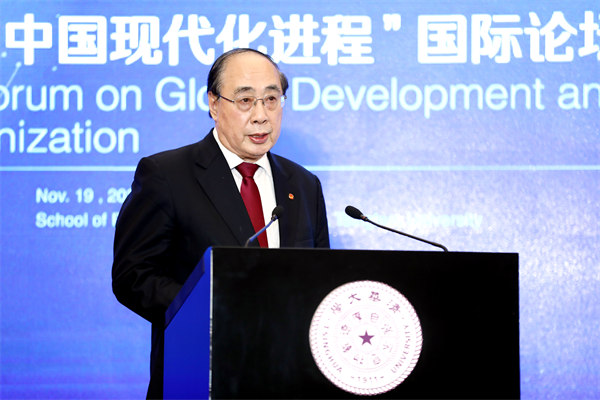
(wu hongbo delivered the keynote speech)
irina bokova gave her speech online titled “china’s contribution to the un sdg agenda, biodiversity and climate governance”. china has emerged as a pioneer in the commitment to the un agenda 2030 for sustainable development while offering the chinese experience in 17 sdg goals and implementing socio-economic policies to ensure that no one is left behind. she believes that china has a lot to offer and share in terms of the sdg goals of ending poverty, addressing climate change, and protecting biodiversity. china has been cooperating with the world in biodiversity conservation and environment protection; it has actively engaged in the global governance of climate change and endeavored for the dual-carbon goals, thereby leading the global green industrial revolution, and advocating green consumption and lifestyle.
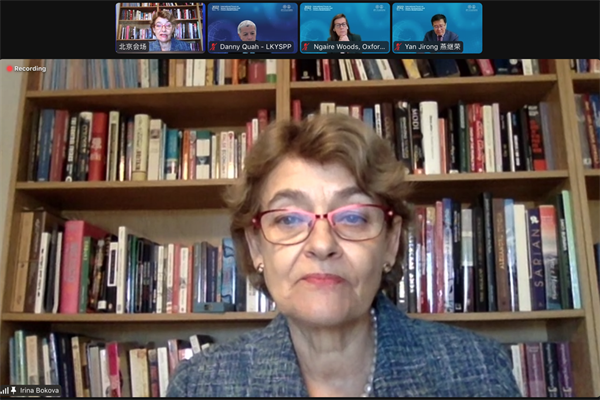
(irina bokova gave her speech online)
vanessa sherrer presented a keynote speech online titled “global development and international cooperation: from a university perspective.” she emphasized that the future of higher education must be truly globalized. hence, universities have the responsibility to offer students with internationally exposed curriculum and to actually practice the international spirit in their education programs. as truly global actors, universities are capable of making an impact on the world’s most heated issues with international cooperation. meanwhile, there is a need to advocate social science and humanities in universities’ international cooperation and global development. the reason is that these fields cultivate independent thinking and comprehension that must be possessed by future leaders.
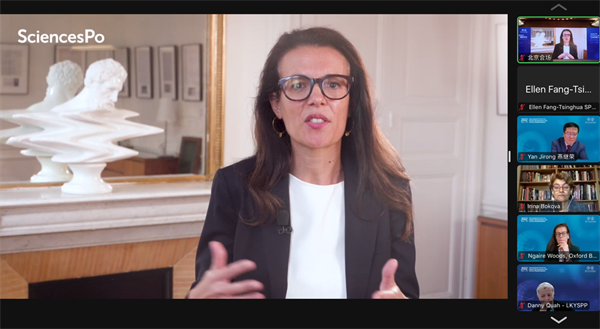
(vanessa sherrer presented a keynote speech online)
the global development and international cooperation panel was moderated by wang youqiang, director of the international innovation center of tsinghua university in shanghai.
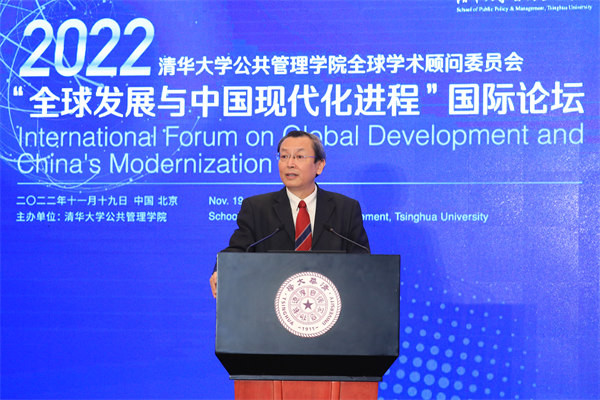
(wang youqiang moderated panel one)
panel two: chinese path to modernization
jiang xiaojuan delivered a keynote speech titled “chinese modernization: chinese characteristics and common features”. she stressed that the chinese modernization is based on china’s national conditions. it is the modernization for a massive population to realize common prosperity, and involves material and cultural-ethical advancement, harmony between humanity and nature, and peaceful development. such a modernization process shares the common features with countries that are in a similar modernization stage. she believed that the public administration community could exert efforts to address the new problems and issues that have been raised in the modernization process.
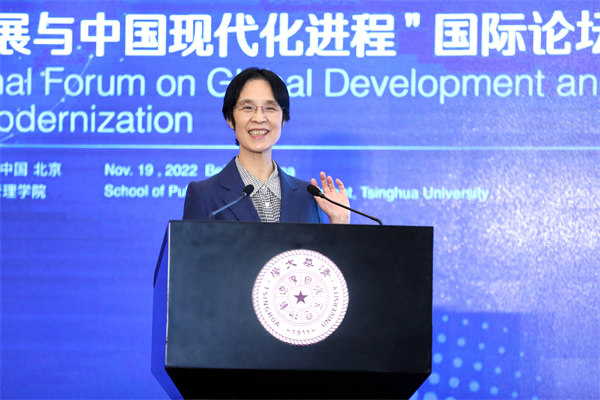
(jiang xiaojuan delivered the keynote speech)
peng wensheng delivered a speech titled “new advantage of scale economy in deglobalization.” he echoed that chinese modernization involves a huge population. the emerging trend of deglobalization has increased the weight of the economy and population for countries to perform the advantage of scale. china is the second largest economy with the largest population in the world, which has given it a full potential for the advantage of scale. nevertheless, note that a healthy market mechanism is crucial in terms of economies of scale. peng proposed three points in his elaboration. first, digital economy is a double-edged sword for economies of scale, requiring a better-regulated digital governance system. second, a new development pattern is needed for the real estate market to form a real mode of land finance. lastly, the financial structure should be improved following the separation of industry and finance, and separate operation.
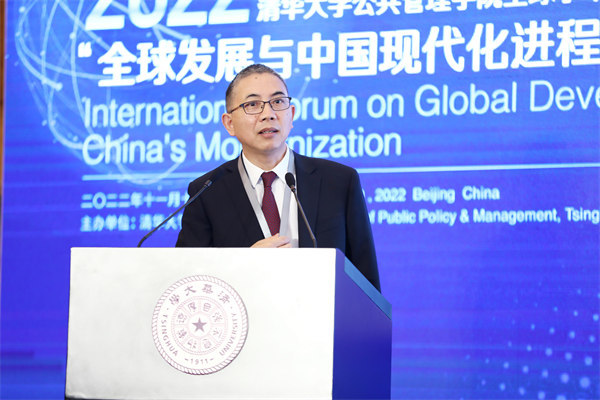
(peng wensheng delivered the keynote speech)
hu an’ gang presented a speech titled “chinese path to education modernization: invest in the people.” the speech covered the relationship between china’s modernization and education modernization, notable achievements of china’s education modernization, and its future in 2021-2035, among others. he argued that the chinese modernization would be impossible without education modernization which requires investment in all people. since its founding in 1949, china has miraculously succeeded in converting an enormous number of illiterate people to become high-quality human resources for the world. based on the available data, china is estimated to grow into a powerful country in higher education in 2035, with the largest population scale and a relatively high-level performance, and successfully realize the chinese education modernization.
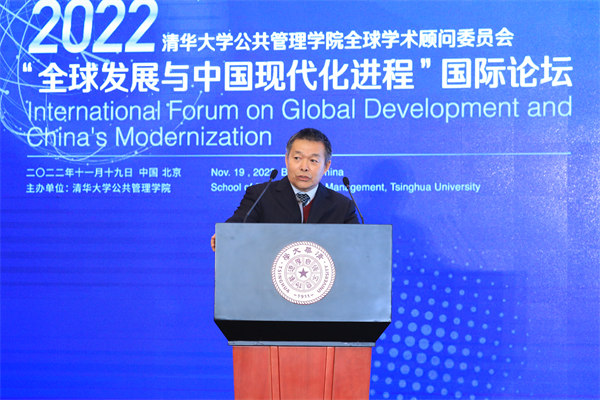
(hu an’ gang presented the speech)
the chinese path to modernization panel was moderated by meng qingguo, executive director of the institute for governance studies of tsinghua university.
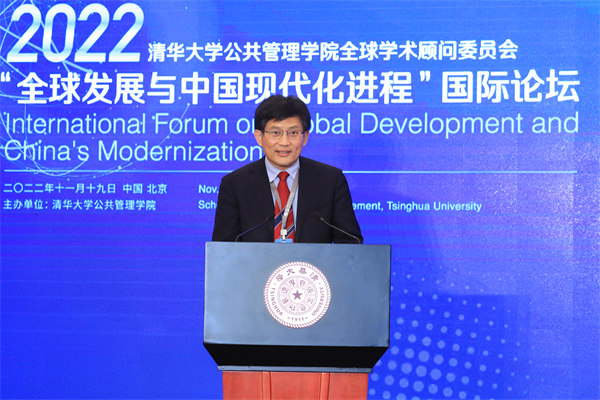
(meng qingguo moderated panel two)
deans’ round-table dialogue: role of schools of public policy and administration/government in global development governance
the deans’ round-table dialogue focused on the “role of schools of public policy and administration/government in global development governance,” with ngaire woods, danny quah, yan jirong, and yan jinming. zhu xufeng, executive dean of tsinghua sppm, moderated the dialogue.
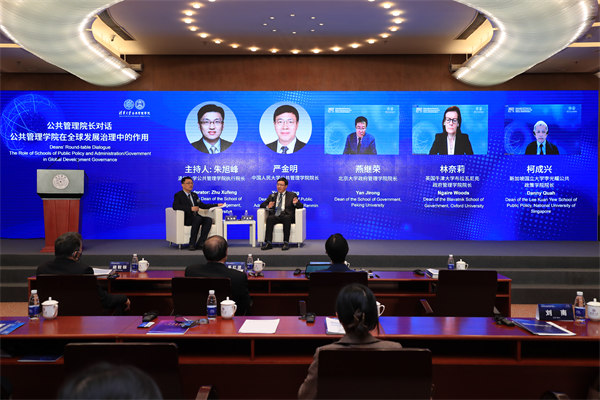
(deans’ round-table dialogue on the spot)
yan jirong mentioned that public administration/government schools are key academic platforms who are capable of fostering global consensus and helping build a shared academic community. moreover, they can also become a participant of the global governance practice. meanwhile, our schools could serve the national development through talent cultivation, maximize the value of think tanks by inspiring academic and research activities, and university-government collaboration, ameliorate policy-making processes through professional policy evaluation, and pursue government reforms through the study of academic projects.
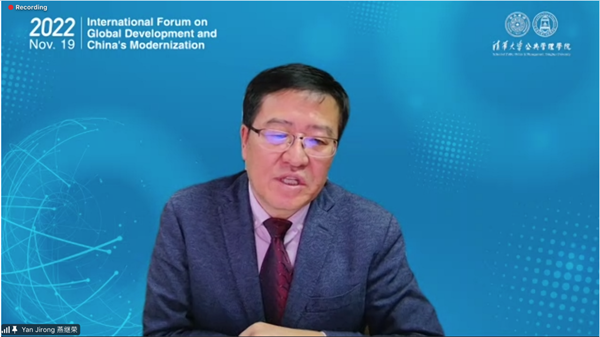
(yan jirong gave his talk)
yan jinming proposed that there is a need for public administration/government schools to work collaboratively and fairly to address global challenges and achieve shared growth in global governance through consultation and cooperation. first, public administration/government schools should be rooted in national conditions and cultivate talents with excellent capabilities to serve the modernization of the national governance system and governance capacity. second, coordinate global comparative studies of the governance systems, and manage to build the independent public administration knowledge system with the chinese characteristics.
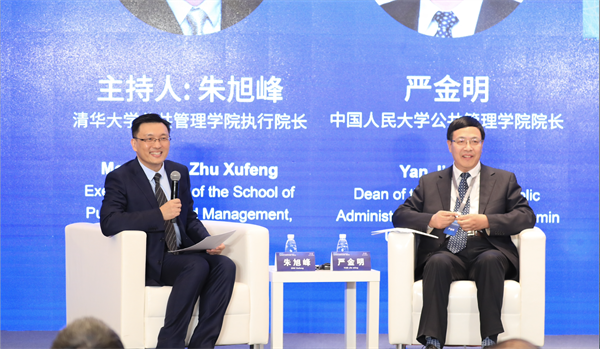
(zhu xufeng(left) moderated the dialogue; yan jinming(right) gave his talk)
ngaire woods joined the dialogue online. she advocated that one of the key methods to fix today’s world is to allow the educational institutions to welcome students globally, and provide them with better education that helps understand and view the world in an objective and tolerant manner. our community has been fragmented and polarized. consequently, it is even more necessary for students to be less judgmental, keeping an open mind to people who are similar to us and different from us. with resilience, persistence and hope, we would learn from each other and mutually contribute to global cooperation.
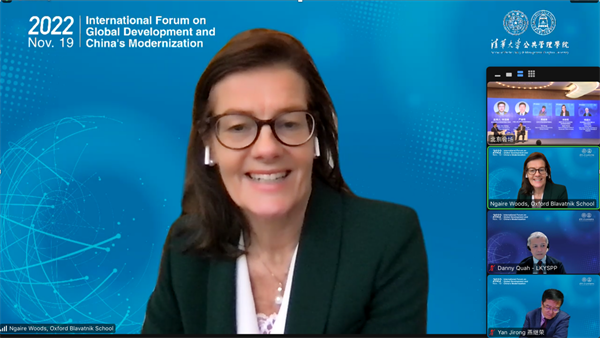
(ngaire woods joined the dialogue online)
danny quah joined the dialogue online. he shared three ways of promoting global cooperation and communication for public administration/government schools. the first is to improve mutual understanding with effective communication tools. the second is to build mutual trust by hosting and participating in international forums, conferences, and projects. the third is to mutually develop an incentive system. furthermore, public administration/government schools should also find balance in their student cultivation between linear thinking and nonlinear thinking, and between academic knowledge and soft skills.
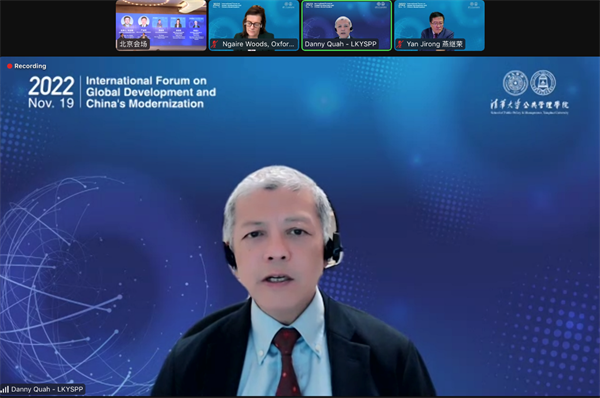
(danny quah joined the dialogue online)
at the closing ceremony of the international forum, zhu xufeng extended his heartfelt gratitude to the invited guests and experts for their participation and insights. in the future, he wishes to have more opportunities to discuss the global development issues and china’s modernization with domestic and international experts. their continuous support on the development of the public administration discipline would be substantially appreciated. together with all, tsinghua sppm would insist global collaboration in scientific research and talent cultivation, and jointly contribute to the advancement of modernizing the national governance system and governance capacity.
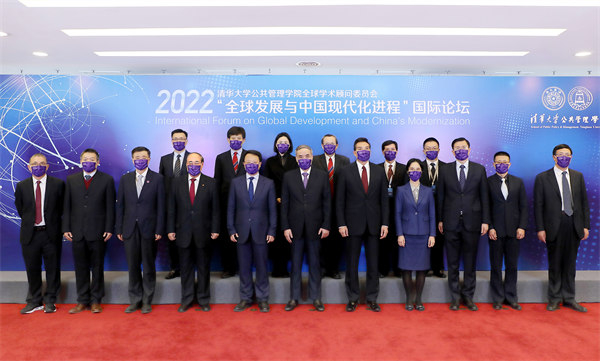
(group photo of the forum participants)
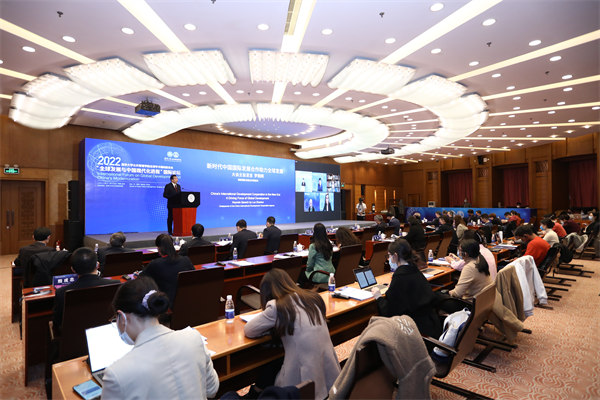
(global development and china’s modernization international forum on the spot)